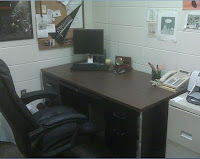Here is a comment from a reader along with my response:
This is a really helpful strategy - I previously used a notebook that was similar, a running log of 'everything'. I was definitely missing the date references and table of contents to make it really work though, and have let it slip for awhile.
I found that I was going through about a notebook every month and half or so. When I go to a recurring committee meetings, I need to be able to review past notes - how would this work best? Use the notebook but add a copy of the meeting notes into the project/committee folder? Most things don't need to be saved in special groups like that, but I'm struggling with project support/meeting notes. Any thoughts?
Thanks!
Jen,
A couple of suggestions come to mind. Since you are maintaining a folder for each committee, make a "table of contents" on the inside of the folder. You could simply list the dates and a couple of key words related to the major topics covered. If that folder goes with you to meetings, you can look at that list and quickly flip to the exact spot in your journal.
Another thought is to use colored Post-it flags. Assign a different color to each committee and flag each meeting with its color. That way, every red flag represents a meeting of the "XYZ" committee, yellow for the "ABC" committee, etc.
Both of those are paper-based options. If you use a smartphone that has a section for notes, another suggestion would be to create a note for each committee called something like "Meeting Notes--(Name of Committee)." Within each note, list the dates that committee met and a few key words about major topics. No matter where you are, you have your smartphone and your journal, so you are only a few seconds away from putting your hands on the notes for any meeting or any committee for the last month and a half.
During "Get Organized Month," this is question is so important because it is a scenario to which so many busy professionals can relate.
What are your thoughts? How do you handle note-taking during meetings, phone calls, etc.?








